2017
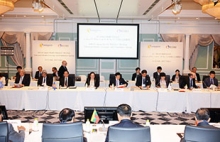
Research to accelerate Universal Health Coverage (UHC) in light of population ageing in ASEAN Countries
The initiative outlines a role for WHO Kobe Centre for leading research on Universal Health Coverage (UHC) and Population Ageing among ASEAN countries. WHO Kobe Centre is therefore pleased to launch a new research program to enable continued ASEAN-Japan collaboration in its “Call for Letters-of-Intent (LOI) - Research to accelerate Universal Health Coverage (UHC) in light of population ageing in ASEAN Countries”. We welcome proposals from academia in ASEAN nations.
Submission deadline: 15 September 2017, 17:00 JST

"Kobe Model" of Early Detection and Management for Dementia
Worldwide, there has been a significant increase in the numbers of people with some form of dementia. In 2012, more than 8 million people have cognitive problems in Japan, including over 4.5 million people with dementia and people with mild cognitive impairment (MCI). This figure will increase with population ageing. Earlier identification of dementia enables health workers, communities and families to implement interventions that can slow the process of cognitive decline, and thus potentially delaying the transition to severe dementia.
WHO Kobe Centre is supporting Kobe University and key partners to conduct a three year project, with support by Kobe City, to conduct an analysis of health data of approximately 80000 Kobe citizens in their 70s, collected by Kobe municipality through its routine Kihon Checklist (KCL) survey. The researchers will further analyze high risk populations among the KCL survey respondents, of approximately 5000 people to measure cognitive function and quality of life. Analysis will also be undertaken of approximately 5000 Frailty Check-up participants to measure cognitive function and quality of life. Lastly, researchers will study the impact of an additional long-term cognitive training program for 100 participants of the “Brain Health Class” program administered by Kobe City last year. The results of the study will inform community based models and policy options for Kobe Municipality, national government and the international community.
“The outcome of the research is expected to contribute to concrete solutions to help improve the quality of life for persons living with dementia and their family members. The research will provide good evidence to the world about how to structure community-based care programmes for dementia,” said Dr Sarah Louise Barber, Director, WHO Kobe Centre.
“The results of this research project will hopefully create a robust “assessment-intervention-feedback” circle within Kobe City. The outcome of the research will be disseminated through academic journals to the world and is expected to contribute to public health policy options by showing a reasonable community model and the evidence behind it,” said Professor Yoji Nagai, lead researcher and Director, Clinical & Translational Research Center, Kobe University Hospital.
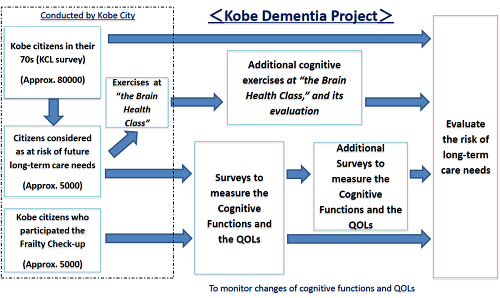
Kobe University (lead research institution):
-
- Dr Yoji Nagai (principal investigator), Professor and Director, Clinical & Translational Research Center, Kobe University Hospital
- Dr Hisatomo Kowa, Professor, Graduate School of Health Sciences, Kobe University
- Dr Yasuji Yamamoto, Associate Professor, Graduate School of Medicine, Kobe University
- Dr Shinsuke Kojima, Medical Science Group, Division of Medical Innovation, Translational Research Informatics Center
- Dr Kiyoshi Maeda, Professor, School of Rehabilitation, Kobe Gakuin University
- Dr Ryoma Kayano, Technical Officer, WHO Kobe Centre
Related Links
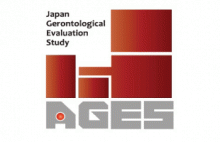
New Project Featuring Japan’s Good Practice in Research-to-Action for Healthy Ageing
Local governments in Japan are implementing a wide range of policies in response to rapid population ageing. While many studies gather scientific evidence that could inform such policies, less attention has been given to how best to apply research findings to government policies and practices.
A new collaborative study between the WHO Kobe Centre and the NCGG will feature a good practice in research-to-action for healthy ageing in Japan – the Japan Gerontological Evaluation Study (JAGES) initiative. JAGES continuously provides direct inputs to local and national decision-making bodies using evidence generated from a survey which has progressively scaled up since its inception in 1999 to include 200,000 older adults in 39 municipalities nationwide in 2016.
Specifically, the new project will:
- Describe the strategies employed by JAGES to collaborate with local governments to conduct large-scale surveys of older adults.
- Review the body of scientific evidence accumulated by JAGES and their implications for healthy ageing policies.
- Demonstrate effective methods for communicating research evidence to policy makers and practitioners, including the development and use of the JAGES Health Equity Assessment and Response Tool, which is a data visualization tool.
- Illustrate JAGES’ impact in diverse municipalities using the case examples of Kobe (Hyogo), Matsudo (Chiba) and Taketoyo (Aichi).
The lessons learned from the JAGES initiative will help other countries strengthen their own practices in data collection, research and knowledge translation toward improving health for all in ageing populations. The study results are scheduled to be published in May 2018 or later.
Dr. Sarah Louise Barber, the Director of WHO Kobe Centre, stated that “Japan, with its super-ageing society, is brimming with valuable lessons that the rest of the world can learn from. I am pleased that, through this study, we will be able to provide scientific evidence that will contribute to policies around the world to support healthy ageing.”
The study’s lead researcher, Dr. Katsunori Kondo, Head of the Department of Gerontological Evaluation at the Center for Gerontology and Social Science of the National Center for Geriatrics and Gerontology (and Professor at the Center for Preventive Medical Sciences of Chiba University), stated that, “We have been working on creating models for social epidemiology research that facilitates policy formulation and implementation. I am very glad that we, in Japan, the society with the world’s longest healthy life expectancy, are able to make a contribution in this way to the rest of the world.”
Research Group members include:
National Centre for Gerontology and Geriatrics (lead research institution):
- Dr Katsunori Kondo, lead researcher, Head, Department of Gerontological Evaluation, Center for Gerontology and Social Science, National Center for Geriatrics and Gerontology and Professor of the Center for Preventive Medical Sciences, Chiba University
- Dr Toshiyuki Ojima, Professor and Chair of Department of Community Health and Preventive Medicine, Hamamatsu University School of Medicine
- Dr Naoki Kondo, Associate Professor, Social Epidemiology and Public Health/Chief of the Department of Health Education and Health Sociology, Graduate School of Public Health, University of Tokyo
- Dr Jun Aida, Associate Professor, Department of International and community oral health, Tohoku University Graduate School of Dentistry
- Dr Masashige Saito, Associate Professor, Faculty of Social Welfare, Nihon Fukushi University
- Dr Megumi Rosenberg, Technical Officer, WHO Kobe Centre
Related links

ASEAN-Japan Research Initiative UHC and Ageing
The Policy Discussion in Yokohama City, Japan, took place from 17-18 July 2017, and focused on Leading Health Reforms in the 21st Century - Universal Health Coverage (UHC), Ageing and Health Systems. It was organized jointly by the WHO Kobe Center and Kanagawa Prefecture Government, with the support of Japan’s Ministry of Health, Labour and Welfare and the ASEAN Secretariat. It was attended by senior government officials from all ASEAN Countries and immediately followed the ASEAN-Japan Health Ministers Meeting on Universal Health Coverage and Ageing Populations in Tokyo, 14-15 July 2017.
The first day was dedicated to technical updates from WHO and participating countries, and practice implementation and research issues related to the “Impact of Population Ageing for Achieving UHC.” During the second day, participants went on field visits to Kanagawa Prefecture’s Life Innovation Center in Kawasaki City and other health institutes in Kawasaki City’s Tonomachi International Strategic Zone. This was also an opportunity to see the almost finished construction of Kanagawa Prefectural Government’s future Medical Innovation School which will invite ASEAN health policy makers to participate in its future Master of Public Health (MPH) program.
“The World Health Organization’s Kobe Centre for Health Development was pleased to support and participate in the rich and constructive policy discussions at this meeting. We will follow up the discussions in developing a new research initiative for ASEAN countries on Universal Health Coverage and Population Ageing,” stated Dr Sarah Louise Barber, Director of the WHO Kobe Centre at the WHO Centre for Health Development at the conclusion of the meeting. The WHO Kobe Centre will launch a call for Letters-of-Intent (LoIs) for the new research initiative in early August.
Agenda and Programme Report
WKC Briefs
- UHC Evidence for Policy and Public Health Practice – WKC Brief 1/2017
- UHC Evidence for Policy and Public Health Practice – WKC Brief 2/2017
- A background paper for the ASEAN-Japan Health Ministers Meeting on UHC and Ageing Populations, Tokyo, Japan, 14-15 July 2017
Presentations
- “Sustainable Universal Health Coverage in the Context of population ageing” by Mr Yuji Kuroiwa, Governor, Kanagawa Prefectural Government, Japan (Part1, Part2)
- “Sustainable Universal Health Coverage in the context of population ageing” by Dr Sarah Louise Barber, World Health Organization, Centre for Health Development, Kobe, Japan
- “Thailand Experience on Universal Health Coverage” by Dr Eakchai Piensriwatchara, Ministry of Public Health, Thailand
- “Impact of Population Ageing on Achieving UHC” by Mr Kozo Watanabe (JICA), Yokyo, Japan
- “ME-BYO Concept and Medical Innovation School” by Mr Yasuo Otani, Special Advisor to Governor of Kanagawa Prefecture (Part1, Part2)
- “Innovation for Health and Care Services for Ageing Populations” by Professor Shunsaku Mizushima, Yokohama City University (Part1, Part2)
- ”WHO new Conceptualisation of Healthy Ageing and its Implications for Innovation” by Dr John Beard, World Health Organization, Department for Ageing and the Lifecourse
- “Overview of the University of Tokyo Center of Innovation ‘Self-Managing Healthy Society’” by Dr Ung-il Chung (Yuichi Tei), The University of Tokyo
- “Research Initiative on UHC and Population Ageing in ASEAN” by Dr Sarah Louise Barber, World Health Organization, Centre for Health Development, Kobe, Japan
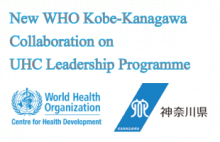
New WHO Kobe-Kanagawa Collaboration on UHC Leadership Programme
UHC, Innovation and Ageing are three main pillars of the new WKC’s research strategies for the 3rd decade. In achieving UHC, more evidence, data, information and case models are needed, which could be adapted to inform future policy options at country level. Under the new research strategy, WKC strives to become a knowledge hub for UHC, Innovation and Ageing. To share the research outcome for future policy options, we agreed with Kanagawa Prefecture to provide the opportunity of face to face policy option dialogue among Asian countries. This meeting realizes this agreement.
Kanagawa Prefecture has the country’s fastest growing older population. It has also taken the lead in many technological and social innovations to support older people. From this year, WKC and Kanagawa Prefecture agreed to conduct the UHC Leadership capacity building programme.
The new programme, “Policy Discussion Meeting on UHC and Population Ageing: Leading Health Reforms in the 21st Century Universal Health Coverage (UHC), Ageing and Health Systems in ASEAN countries” will hold technical delegations among ASEAN countries. The technical focus of the discussions will be on mainly UHC and rapid ageing in the Asian region.
New WHO Kobe-Kanagawa Collaboration on UHC Leadership Programme
Date and time: 17-18 July 2017
Venue: Hotel Mielparque Yokohama, Kanagawa Prefecture, Japan
Day 1: UHC governance and sustainability, Lunch Seminar "Technological Innovation", Keynote Speech “Me-Byo Concept and Health Care New Flonteir, Session II: Innovation for Health and Care Services for Ageing Populations, Session III: Summary and closing
Day 2:Site visit to integrated health service facilities in Kanagawa Prefecture
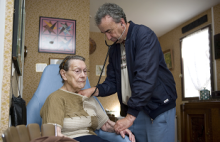
Request for proposals Review of service delivery models for older people that maximize quality of life
WHO Kobe Centre invites proposals for a rapid review of service delivery models that are fit for older people at the end-of-life. This research will document and evaluate delivery models for quality of life and costs, and provide an analysis of knowledge gaps.
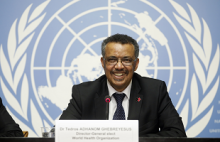
Together for a healthier world Dr Tedros Adhanom Ghebreyesus
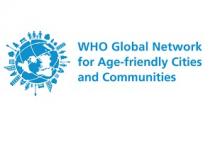
Join the Global Network of Age-friendly Cities and Communities (GNAFCC)
The vision of the GNAFCC is that every city and community strives to become increasingly age friendly. Creating age-friendly environments requires a process across the life course that progressively improves the fit between people’s needs and the environments in which they live.
GNAFCC now has new membership documents. The document is available in English, Spanish, and Japanese.
In 2015, WKC published the “Measuring the age-friendliness of cities: a guide to using core indicators”, which provides technical guidance on selecting and using core indicators, monitoring and evaluating Age-friendly City initiatives.
- Application form to join the WHO Global Network for Age-friendly Cities and Communities
- WHO Global Network for Age-friendly Cities and Communities
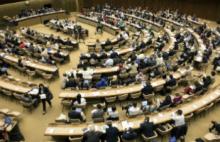
Dementia has gained international attention through a Global Action Plan
The global plan outlines comprehensive approaches to address dementia in public health, improving the lives of people with dementia, their families and the people who care for them. It also aims at reducing the impact of dementia on communities and countries. Areas for action include advocacy, fostering dementia awareness and friendliness, reducing the risk of dementia and improvement in diagnosis, treatment and care.

Tobacco – a threat to development
It is not only governments who can step up tobacco control efforts: people can contribute on an individual level to making a sustainable, tobacco-free world. People can commit to never take up tobacco products. Those who do use tobacco can quit the habit, or seek help in doing so, which will in turn protect their health as well as people exposed to second-hand smoke, including children, other family members and friends.
You can download the poster in Japanese from the link below.

